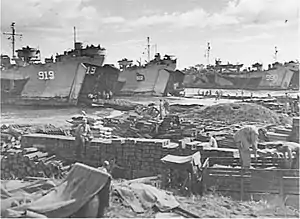USS LST-919
USS LST-919 was an LST-542-class tank landing ship in the United States Navy. Like many of her class, she was not named and is properly referred to by her hull designation.
 USS LST-919, LST-922, and LST-990 beached at Mindoro Island, Philippines, 15 December 1944, unloading supplies and equipment. | |
| History | |
|---|---|
| Name: | LST-919 |
| Builder: | Bethlehem-Hingham Shipyard, Hingham, Massachusetts |
| Yard number: | 3389[1] |
| Laid down: | 11 April 1944 |
| Launched: | 17 May 1944 |
| Commissioned: | 31 May 1944 |
| Decommissioned: | 5 August 1946 |
| Stricken: | 25 September 1946 |
| Identification: |
|
| Honors and awards: |
|
| Fate: | sold, 10 January 1948 |
| Status: | resold to Argentina, 1 March 1948 |
| Name: | Cabo San Isidro |
| Acquired: | 1 March 1948 |
| Decommissioned: | 8 August 1978 |
| Refit: | converted to Motor Torpedo Boat tender, 1950 |
| Identification: | Hull symbol: BDT6 |
| Fate: | transferred to the Naval Transport Service, 1959 |
| Status: | sold for scrapping, 23 March 1980 |
| General characteristics | |
| Class and type: | LST-542-class tank landing ship |
| Displacement: |
|
| Length: | 328 ft (100 m) oa |
| Beam: | 50 ft (15 m) |
| Draft: |
|
| Installed power: |
|
| Propulsion: |
|
| Speed: | 11.6 kn (21.5 km/h; 13.3 mph) |
| Range: | 24,000 nmi (44,000 km; 28,000 mi) at 9 kn (17 km/h; 10 mph) while displacing 3,960 long tons (4,024 t) |
| Boats & landing craft carried: | 2 x LCVPs |
| Capacity: | 1,600–1,900 short tons (3,200,000–3,800,000 lb; 1,500,000–1,700,000 kg) cargo depending on mission |
| Troops: | 16 officers, 147 enlisted men |
| Complement: | 13 officers, 104 enlisted men |
| Armament: |
|
| Service record | |
| Operations: |
|
| Awards: | |
Construction
LST-919 was laid down on 11 April 1944, at Hingham, Massachusetts, by the Bethlehem-Hingham Shipyard; launched on 17 May 1944; and commissioned on 31 May 1944,[3] with Lieutenant Nils K. Stamps, USNR, in command.
Service history
During World War II, LST-919 was assigned to the Asiatic-Pacific theater and took part in the Leyte landings in October and November 1944, the Lingayen Gulf landings in January 1945, and the Mindanao Island landings in April 1945.[3]
Following the war, LST-919 performed occupation duty in the Far East and saw service in China until early April 1946. She returned to the United States and was decommissioned on 5 August 1946, and struck from the Navy list on 25 September, that same year. On 10 January 1948, the ship was sold to Pablo N. Ferrari & Co. for operation.[3] On 1 March 1948, she was resold to the government of Argentina.[4]
Argentine service
In Argentine service, LST-919 was renamed Cabo San Isidro and redesignated BDT-6 (Buque Desembarco de Tanques), later Q46. She was retired in 1979.[5] She still existed at the time of the Falklands War, but was not available for use.
Awards
LST-919 earned three battle stars for World War II service.[3]
Bibliography
Online resources
- "LST-919". Dictionary of American Naval Fighting Ships. Naval History and Heritage Command. Retrieved 20 May 2017.
 This article incorporates text from this source, which is in the public domain.
This article incorporates text from this source, which is in the public domain. - "Bethlehem-Hingham, Hingham MA". www.ShipbuildingHistory.com. 11 August 2011. Retrieved 20 May 2017.
- "USS LST-919". Navsource.org. 26 September 2015. Retrieved 20 May 2017.
Printed resources
- Friedman, Norman (2002). US Amphibious Ships and Craft: An Illustrated Design History. Naval Institute Press. ISBN 1-55750-250-1.CS1 maint: ref=harv (link)